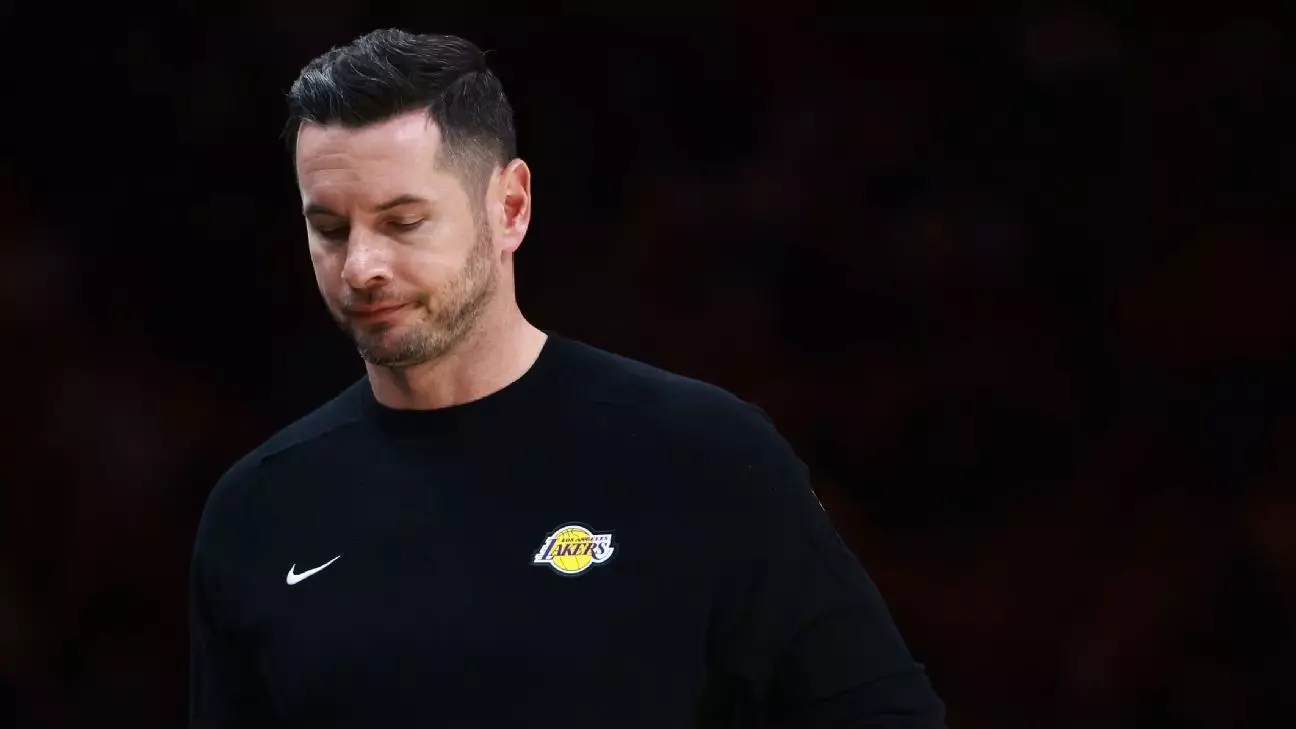The recent performance of the Los Angeles Lakers has cast a long shadow over an organization once synonymous with success. After a promising start to the season, characterized by a strong 10-4 record, the Lakers have spiraled into a troubling slump, suffering six losses in their last eight games. The stark reality of their situation was epitomized by the disastrous 134-93 defeat against the Miami Heat, where guard Tyler Herro’s explosive display put the Lakers’ defense to shame. Embedded within this massive defeat is a palpable sense of confusion and disarray echoed by their coach, JJ Redick, who voiced concerns over the team’s fundamental execution of game plans.
This collapse raises critical questions about the Lakers’ cohesion and individual commitment to the team’s objectives. Redick stressed the importance of ownership, emphasizing the need for players not just to execute but to take accountability for their play. His critique serves as both a wake-up call and a plea for unity in a locker room that seems increasingly splintered.
LeBron James, a veteran presence and a key figure in shaping the team’s direction, showed solidarity with Redick’s sentiments after the game. As the leader with the most significant influence on the court, James recognized the need for collective accountability. However, he was swift to clarify that the responsibility does not lie solely with the coaching staff but rather the players themselves. His acknowledgment of the team’s failures while distancing the coaching from blame sheds light on a troubling underlying issue within the squad: an apparent lack of direction and determination.
Anthony Davis, once heralded as an MVP contender, has found himself at the center of scrutiny for his poor performances. With declining shooting numbers and a lack of offensive contribution, Davis’s self-assessment revealed a harrowing realization of his role in the team’s trajectory. As he wrestles with expectations, his candid discussions reflect the pressure that accompanies being a top player in a franchise that demands success. Yet such might be the double-edged sword of leadership, as he recognizes that his play directly impacts the overall performance of the team.
The numbers from the Lakers’ recent match against Miami illustrate the severity of the team’s struggles. Miami’s dominance in rebounding (52-36) and a staggering 24 successful three-pointers underline a stark disparity in performance. The Lakers, conversely, struggled from beyond the arc, shooting a paltry 22.7% on their three-point attempts. Such disparities clearly reveal more than just skill—there is an acute lack of synergy on the court. The Lakers’ bench, often a source of strength, was significantly outscored by Miami’s second unit, further showcasing the lack of depth in roster performance.
This disparity highlights not only physical exhaustion and inefficiency but also hints at the mental turmoil players may be experiencing. The Lakers must reconcile their once-promising identity and adapt within a changing league landscape where teamwork and chemistry have become crucial for success.
In the face of adversity, commonly referred to as a “wake-up call,” LeBron emphasized the importance of staying emotionally stable. “Stay even-keeled,” he asserted, demonstrating the wisdom acquired through years of experience. This mindset is vital not only for the players but for the organization as a whole. The NBA season is unpredictable, filled with week-to-week fluctuations that can easily derail a team’s momentum.
As they prepare to face the Atlanta Hawks—a team that is currently on a winning streak—the Lakers have an opportunity to recalibrate. Davis’s earnest call to action highlights an urgent need for not only individual improvement but also a rallying cry for unity. The path toward redemption will require effort and communication, a concerted push from each player to reintegrate the spirit of teamwork that has become overshadowed by recent events.
The Los Angeles Lakers find themselves at a crossroads. The current trajectory demands not only introspection but also a collective reformation of their team identity. It’s clear they have the tools necessary to succeed but must first confront their obstacles, restore accountability, and regain cohesion as a unit. The spotlight is on them; how they respond will define whether this slump is merely a fleeting moment or a more profound crisis that could affect the entire season. As they navigate through this challenging phase, fans and analysts alike will be watching closely to see if they can reforge their potential into a force that commands respect on the court once again.

